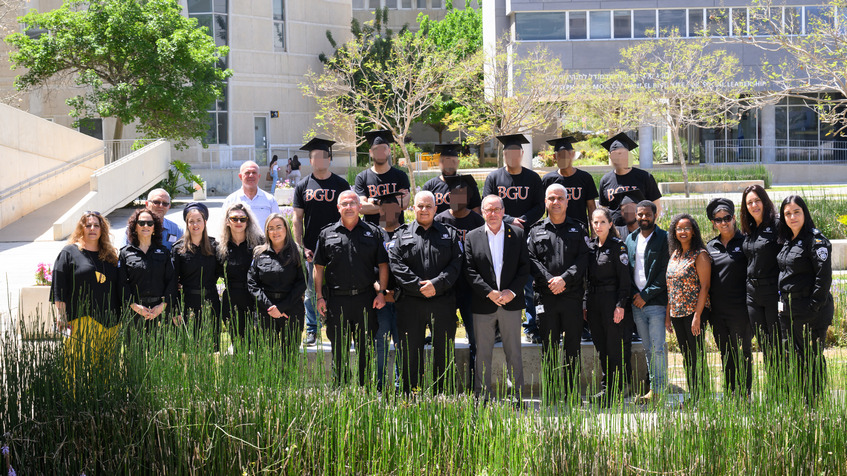
Want an MBA from an Entrepreneurial Hot Spot?
Want an MBA from an Entrepreneurial Hot Spot?
January 8, 2009
Negev Development & Community Programs, Social Sciences & Humanities
Dave McGeady did what you’re supposed to do to get into an elite MBA program. Two years of investment banking with a top firm. Two years in consulting. Crushed the GMAT exam. And now he’s studying for the MBA of his choice.
It’s just that he’s living in Tel Aviv, not Cambridge, Mass. – or New York, Geneva, or London.
“If you want to be a great innovator and a great thinker, if you want to think like one of the guys who Harvard Business School invites to speak to the students, you have to do something different, you have to push your boundaries,” says Mr. McGeady, an Irishman who studied engineering at Trinity College in Dublin, Ireland. “And by coming to Israel and by doing a course like this, I think that that will hopefully put me in a position for years to come.”
Israel is renowned for its entrepreneurial spirit, but its business schools aren’t typically included in the cadre of top international programs. Not one of the country’s roughly dozen English-language MBA programs was ranked in The Economist in its 2009 list of the world’s top 110 institutions.
But on the strength of the nation’s economic dynamism, a diverse student experience, and academic programs with strong ties to established schools, an MBA in Israel could be a fruitful investment for Western students with a passion for entrepreneurship and a willingness to stomach an often turbulent political situation.
“Within Israel, you’ve got the infrastructure and the economic ecosystem that exists in Silicon Valley,” says Phil Cox, who heads Silicon Valley Bank’s operations in Israel and Europe.
Consider the following. Israel has 60 companies listed on the high-tech heavy NASDAQ exchange, the largest contingent of non-U.S. firms. That’s compared with the so-called “BRIC” nations of Brazil (1), Russia (0), India (3), and China (0). It even beats the tax-friendly Cayman Islands (53).
In terms of entrepreneurship and innovation, international investment firm Legatum ranked Israel 23rd worldwide in 2009, just below Taiwan. In 2008, Israel attracted as much foreign venture capital as France and Germany combined, according to The Economist.
Into that environment step Israel’s budding MBA offerings, where going east doesn’t mean giving up the academic rigor of the West. At Ben-Gurion University of the Negev in Beer-Sheva, for example, the [10-year-old Honors] MBA program is built around Columbia University’s academic regimen, with several professors actively lecturing at both universities.
From Tel Aviv University’s Sofaer International program to Interdisciplinary Center Herzliya’s Global Entrepreneurship MBA, professors have claimed their Ph.D.s from business heavyweights from Stanford, Northwestern and Harvard.
What makes the entrepreneurial spirit of the courses so powerful, their organizers say, is the fusion of the country’s dynamic, global ecosystem and a diverse student body.
Israelis “are world businessmen and women. There are places in the world, and arguably some places in the U.S. are the worst at this, where they don’t look beyond the edges of their state or county,” Mr. Cox says.
“Whereas these guys travel extensively. They do have a pretty firm of view of the important places in the world.”
Tel Aviv University’s inaugural Sofaer MBA class in 2009 comprised 55 students from 20 countries, including an Indian military general and a former Israeli basketball pro. Bar-Ilan University in Ramat Gan, with annual classes under three dozen students, counts alumni from Australia to China to Ecuador.
International students are “biting into much more than they would have gotten in the United States,” says Gil Glaser, spokesman for the Guilford Glazer School of Business and Management at Ben-Gurion University. “They’re getting totally different people with different cultural backgrounds and different life experience.
These are people who have done things. These are people who served as pilots in the Israeli air force or they’ve undertaken junior managerial positions and then taken off to pursue their studies.”
Then there is the cost. Israeli programs run between 12 and 15 months. Total cost of attendance – including tuition, food, rent, and books – rings in at around $40,000 a year. That’s compared with Harvard Business School’s estimated $76,600.
As with all MBA programs, there are trade-offs. By not attending a top-flight U.S. or European school, students will miss out on recruiting by many, if not all, of the world’s most exclusive firms. Israel’s contentious political relationship with its neighbors makes life a bit more stressful than two years in, say, Cambridge or Chicago.
And the relative youth of the English-language programs means that alumni aren’t in the high-powered positions that make for grand honor rolls on a school’s Web site.
But in Israel’s dynamic environment, MBA administrators forecast that won’t be the case forever. “Most of our alumni — they are kind of halfway up the totem pole in terms of seniority,” Mr. Glaser says. “They’re not CEOs – yet.”



